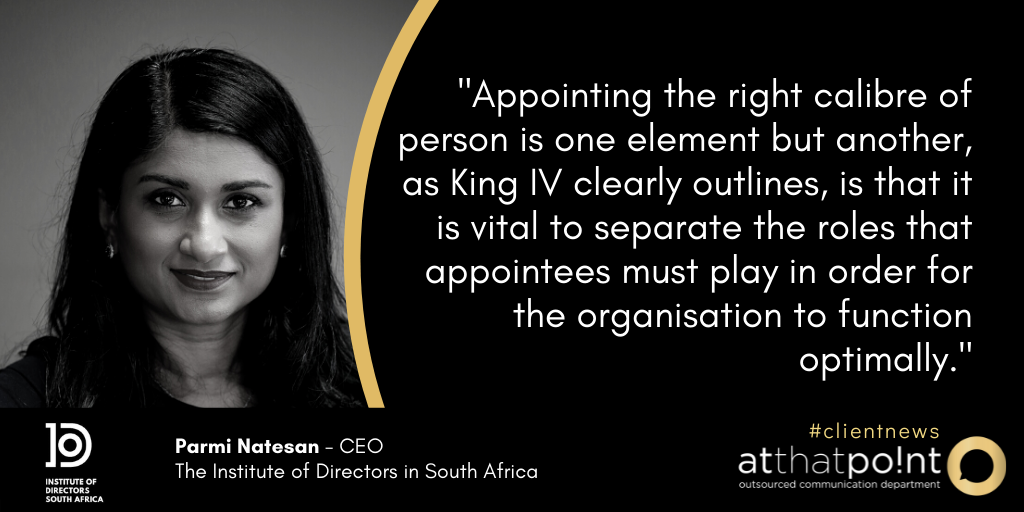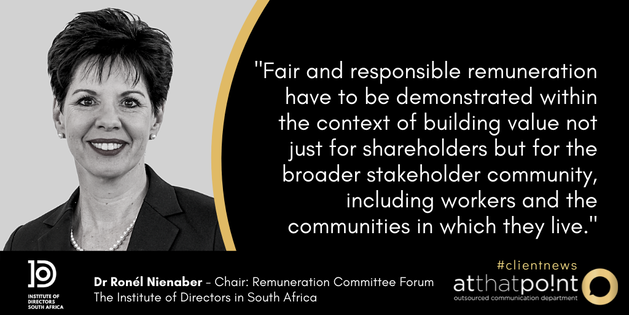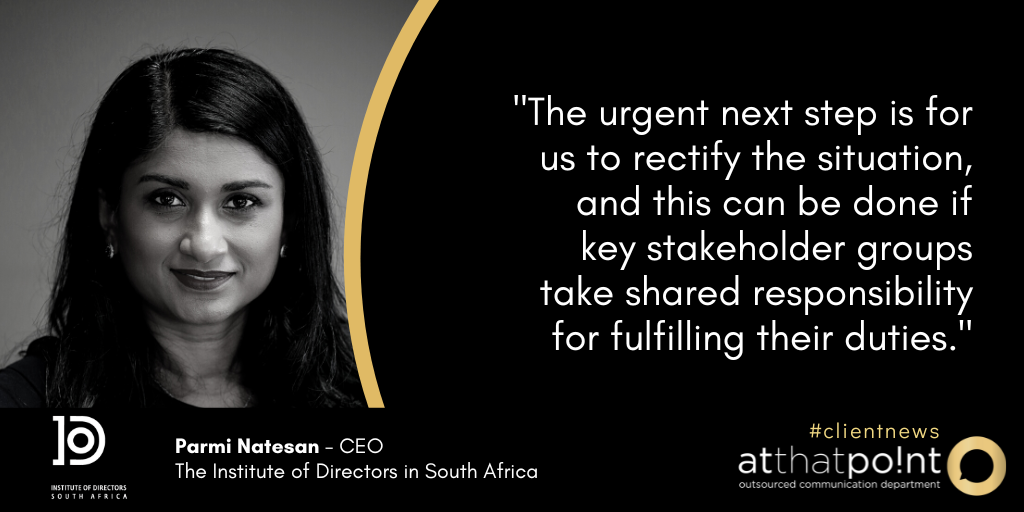|
The news that John Lamola will assume the roles of both Executive Chair and CEO of South African Airways (SAA) suggests that the state has not learned the lessons of the past few years regarding the importance of good governance, says Parmi Natesan, CEO, Institute of Directors in South Africa (IoDSA). As the Zondo Commission’s reports show, governance lapses in terms of appointments, oversight and accountability are some of the fundamental causes of the implosion of our key state-owned enterprises, among them SAA.
“It is disheartening that the state seems to have overlooked governance best practice as espoused by the King Report on Corporate Governance,” she says. “This departure from governance best practice is all the more surprising in light of the Zondo Commission’s assertion that the way in which board and senior executive appointments were made simply cannot continue.[1] “Appointing the right calibre of person is one element but another, as King IV clearly outlines, is that it is vital to separate the roles that appointees must play in order for the organisation to function optimally. CEOs and chairs fulfil distinct, complementary roles and combining them is not ideal—especially in the case of the national carrier which has a long road to travel to re-establish its bona fides.” King IV Principle 7 states that The governing body should comprise the appropriate balance of knowledge, skills, experience, diversity and independence for it to discharge its governance role and responsibilities objectively and effectively. Recommended Practice 31 states that the chair should be an independent non-executive director, while Recommended Practice 34 specifically says that the CEO of the organisation should not also chair the governing body.[2] According to Muhammad Seedat, Chair of the IoDSA Board, there are very good reasons for the clear separation of the roles of chair and CEO advocated by King IV. They may be summarised as follows:
[1] Judicial Commission of Inquiry into State Capture Report: Part IV(4) at 2500, available at https://www.statecapture.org.za/. [2] IoDSA, Report on Corporate Governance for South Africa 2016, p 54, 57. ENDS MEDIA CONTACT: Stephné du Toit, [email protected], 084 587 9933, www.atthatpoint.co.za For more information on the IoDSA please visit: Website: www.iodsa.co.za Twitter: @The_IoDSA LinkedIn: Institute of Directors in South Africa Company Page Facebook: Institute of Directors South Africa
0 Comments
The recent suggestion by PSG CEO Piet Mouton that the requirement to disclose executive pay should be made optional raises important questions about an issue that consistently attracts controversy. This follows news reports of Sibanye-Stillwater CEO Neal Froneman receiving R300 million in remuneration for 2021, most of which related to conditional share proceeds.
“The issue of executive pay is highly complex, and quoting the data disclosed in the annual report without the necessary context can be misused by various stakeholders to further their own interests; this, however, does not mean that disclosure of executive pay is unnecessary,” says Dr Ronél Nienaber, Chair: Remuneration Committee Forum, Institute of Directors in South Africa (IoDSA). “Transparency is key to good governance globally, and thus to attracting investment—remuneration committees have to ensure absolute clarity in the remuneration reports when they describe how they reached their remuneration decisions, specifically indicating the alignment between performance outcomes and reward outcomes. Fair and responsible remuneration have to be demonstrated within the context of building value not just for shareholders but for the broader stakeholder community, including workers and the communities in which they live.” She notes that South African companies, in contrast to countries that have similar disclosure requirements but are operating in well-developed economies, face the additional challenge of a persistently worsening socio-economic divide, providing a context in which executive pay can be leveraged by unions to justify pay demands. Executive pay is not the cause of unemployment and poverty in our country; indeed, high-performing executives play a crucial role in creating jobs, growing the economy and alleviating poverty, and should be rewarded accordingly, she says. Dr Nienaber argues that remuneration committees need to ensure that targets linked to the variable pay plans are within management’s control, verifiable, relevant and with sufficient amount of stretch. Where there is significant upside at the end of the performance period due to tailwinds, the committee needs to give careful thought on how to handle this and ensure consistent decision making over time. The remuneration committee would also need to have a strategy for dealing with the opposite case in which a dip in prices would have eroded share values and so reduced executive performance bonuses. In each case, the remuneration committee would need to show how these facts were factored into their deliberations and ultimate decision. For example, in the case of Mr Froneman, it is clear that he has benefitted from the positive effects of the resources boom on the share price. Ideally, the remuneration committee should clearly explain why it did not intervene to cap the benefit caused, in part, by the commodity cycle. Such a conversation would include the investments made by the company into society more broadly, with the aim of showing how the benefits from the macroeconomic context have been distributed beyond the fortunate few. It is also clear that there is a huge need for initiatives to educate the workforce as well as other stakeholders, including the media, on how executive remuneration is constructed and approved. It should also be recognised that the disclosure of executive pay, albeit necessary, infringes on executives’ right to privacy, creating enormous security risks for them and their families. Pay disclosure may ultimately detract from the attractiveness of these positions. “Nevertheless, one of the fundamental characteristics of good governance is transparency. Whatever difficulties transparency raises, we need to acknowledge that the need for disclosure has undoubtedly meant that remuneration committees have been giving this important matter more consideration when they are making their decisions, and that’s to everybody’s benefit,” adds Parmi Natesan, CEO of the IoDSA. “Disclosure, well done, builds trust in the long run.” ENDS MEDIA CONTACT: Stephné du Toit, [email protected], 084 587 9933, www.atthatpoint.co.za For more information on the IoDSA please visit: Website: www.iodsa.co.za Twitter: @The_IoDSA LinkedIn: Institute of Directors in South Africa Company Page Facebook: Institute of Directors South Africa Reacting to the publication of the Zondo Commission’s latest reports on the capture of Eskom,[1] the Institute of Directors in South Africa (IoDSA) says that a concerted effort is necessary to address the ongoing issue of how directors and senior appointments are made in the public sector.
In its reports, the Commission notes that the Department of Public Enterprises has formulated procedures for the proper appointment of directors of state-owned enterprises (Zondo IV (3): 1273) but later it also states, “The way members of Boards of state owned [sic] companies are appointed cannot remain as it has been during all the years which have been covered by the investigation of the Commission. The same applies to the appointment of Chief Executive Officers and Chief Financial Officers of these companies” (Zondo IV (4): 2500). “Read together, it seems as though the problem is not that guidelines do not exist, but that they are improperly followed. This is an ongoing problem because, even after state capture became big news, governance remains shocking as we can see in the mismanagement of pandemic-related disaster relief funds,” argues IoDSA CEO, Parmi Natesan. “Clearly, if we had appointed the right people for the job in the first place, or at least removed the ineffective ones, we would be in a better place." “The urgent next step is for us to rectify the situation, and this can be done if key stakeholder groups take shared responsibility for fulfilling their duties.” Rule-setters. The relevant government department must amend the definition of an individual’s suitability for appointment to include their track record as a director as well as evidence of commitment to being a professional director (such as membership of a directors’ professional body or the achievement of a director designation) Evaluators. The relevant Ministers charged with evaluating the suitability of individuals for a board appointment must stick rigorously to the rules. Zondo IV (3) at 1562 identifies the way in which the Eskom board departed from the provisions of the company’s own Memorandum of Incorporation when appointing Brian Molefe as CEO. It’s also important that evaluators are themselves experienced board members so they know what directorship competencies to look for. “Evaluators are entitled to make use of external expert assistance in identifying and evaluating candidates, and should do so,” Ms Natesan says. “They should not be taking the easy option, and they should certainly conduct a rigorous due diligence of all candidates at the outset.” Directors. Once appointed, directors must proactively educate themselves about what their position entails. A first step is to know the law, especially the Constitution, the Public Finance Management Act and relevant National Treasury regulations, the Companies Act and its regulations, and the entity’s founding legislation and Memorandum of Incorporation. Good knowledge of the Common Law and King IV is also essential. Directors must be knowledgeable about any existing and applicable guides, handbooks and codes. They must know how to report wrongdoing and, if they come across it, report it immediately. They need to be courageous in doing what is right, and not fall into the trap of going with the crowd. Overseers. Finally, the relevant Ministers and ultimately Parliament, who are charged with oversight of our SOEs, should measure the board against high standards, not the bare minimum. Specifically, they should understand how to get rid of underperforming or unsuitable directors, and take action promptly to do so. “Directors are important—just how important the Zondo Reports demonstrate. And yet ensuring that the best, most qualified candidates are appointed is not difficult—this is something we can get right now if we have the will, and we should not delay,” Ms Natesan says. [1] Judicial Commission of Inquiry into Allegations of State Capture, Corruption and Fraud in the Public Sector Including Organs of State IV (3) and (4), The Capture of Eskom, available at https://www.statecapture.org.za/. ENDS MEDIA CONTACT: Stephné du Toit, [email protected], 084 587 9933, www.atthatpoint.co.za For more information on the IoDSA please visit: Website: www.iodsa.co.za Twitter: @The_IoDSA LinkedIn: Institute of Directors in South Africa Company Page Facebook: Institute of Directors South Africa |
Archives
July 2024
Categories
All
|




 RSS Feed
RSS Feed